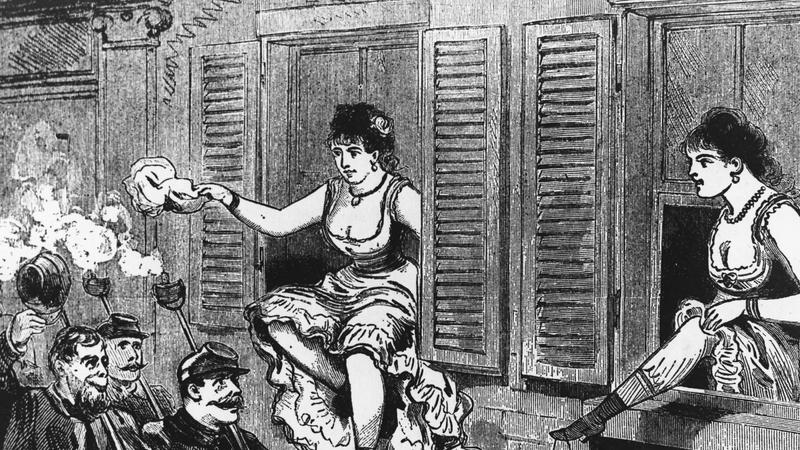So That’s Why They're Called Hookers!
By | August 22, 2019

There are a surprising number of nicknames for the oldest profession in the world---call girls, streetwalkers, strumpets, ladies of the night---but the term you've probably heard the most is "hooker." Unlike other terms, however, it is not easy to see how the euphemism connects to the activity. How exactly does sex work relate to hooks? Whatever it is, it sounds painful. On the contrary, however, it all goes back to a Civil War major, a rowdy New York seaport, and medieval pickpockets.

The Frat Boy General
In the early days of the American Civil War, the Union Army was led by Major General Joseph Hooker, who earned the nickname "Fighting Joe." Hooker may have had commanding skills as a military leader, but his camp was in somewhat more disarray. Drinking, partying, and all-around debauchery was rampant under Hooker's command. This type of behavior eventually led to Fighting Joe's demotion, as his men were often too drunk, hungover, or sleep-deprived to be effective soldiers. After a few costly defeats, Hooker was replaced as leader of the Army of the Potomac.

Hooker's Division
A common sight in Hooker's camp, alongside the discarded vessels of liquor, were large numbers of prostitutes hoping to earn a few coins by keeping the lonely soldiers happy. Although there is no hard evidence to prove that Fighting Joe enjoyed the company of these "fallen doves" himself, he definitely allowed his men to partake of their services. The prostitutes who followed the troops from camp to camp were referred to as "Hooker's Division." Though it's doubtful that this phenomenon alone is responsible for the term, it was a coincidence that certainly helped to spread it. A more likely origin point is ...

A Rowdy Seaport: The "Resort for the Lewd"
Another story claims that the word refers to a place, not a person. In New York's Lower East Side is a point of land that juts into the East River that was known as early as the 1600s as Corlear's Hook after an early plantation owner, Jacobus von Corlear. The man, by all accounts, was an upstanding fellow. His land, however, was a prime location for seafaring activities around the island of Manhattan.

New York's Most Notorious Red Light District
By the turn of the 19th century, Corlear's Hook was home to shipbuilders and a naval yard, and the influx of sailors to the area brought troves of business-minded women seeking to cater to their needs. Within a few decades, Corlear's Hook was New York City's most infamous red light district, boasting more than 85 brothels. One newspaper of the time wrote that the areas was "a resort for the lewd and abandoned of both sexes with its streets abounding every night with preconcerted groups of thieves and prostitutes." The most notorious residents of Corlear's Hook became known as "hookers."

Medieval Pickpockets and Riff Raff
Most of the prostitutes in the medieval era had particular sets of skills. In addition to the tricks of the trade, they were also petty criminals and pickpockets, and they were just as creative in this endeavor as they presumably were in their primary occupation. They used long poles with hooks on the end to snatch purses, satchels, and other valuables from their unsuspecting victims. It was often a collaborative effort, with one team member keeping the victim occupied while another used the hook to steal away his coin purse. The obvious nickname for this half of the team was hooker. Soon, the word "hooker" was just synonymous with "prostitute," which must have been very annoying to the more pedantic members of the trade.

A Hooker By Any Other Name
"Hooker" is still a common term for a sex worker, but many bristle at it. Although the lines are somewhat blurry, there's a definite hierarchy in the trade, and each rung has its own preferred terminology. The word "prostitute" itself is rather clinical. A "call girl" implies a high-end sex worker. A "lady of the evening" has a slightly old-fashioned and even romanticized connotation, while "streetwalker" conjures images of a desperate woman who has turned to the oldest profession due to unfortunate circumstances. But a hooker ... now that implies a person belonging on the lowest rung of the hierarchy. It is a name associated with the loose women that frequented the Civil War camps, the soiled doves of the shipyards of New York, and the wicked thieves of medieval England. No, thanks.

